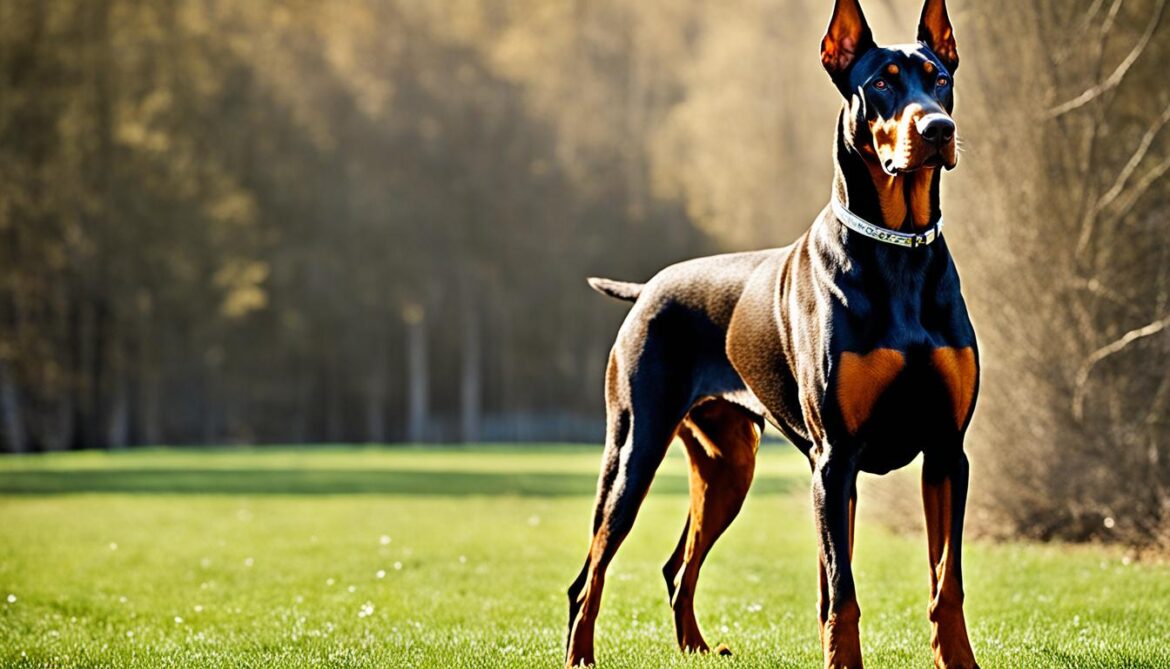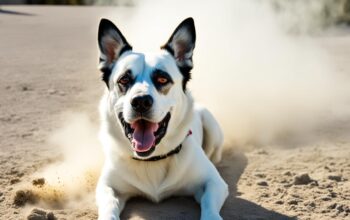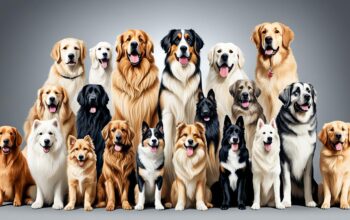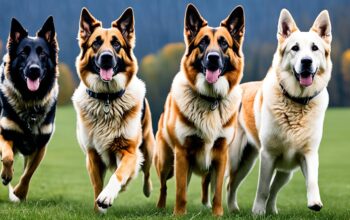The Doberman Pinscher is a large and noble dog breed that originated in Germany in the late 19th century. They were first bred by Karl Friedrich Louis Dobermann and quickly gained popularity as guard and police dogs. With their distinctive appearance and impressive qualities, Dobermans have become a beloved breed among dog enthusiasts.
Dobermans are known for their intelligence, loyalty, and protectiveness. They have a short and smooth coat, which can come in various colors, including black and brown with rust-colored markings. Their striking appearance and confident demeanor make them stand out in any setting.
When it comes to temperament, Dobermans are highly trainable but can also be stubborn at times. Early training and socialization are crucial to ensure they develop into well-rounded and well-behaved dogs. With proper guidance, they can be affectionate and sweet with their families, forming strong bonds.
Regular exercise is essential for Dobermans, as they are medium-to-high energy dogs. They thrive in an environment where they can engage in physical activities and mental stimulation. This breed requires an active lifestyle to prevent boredom and destructive behavior.
Key Takeaways:
- Dobermans are a large and noble breed known for their loyalty and protectiveness.
- They have a short, smooth coat and come in various colors, such as brown and black with rust-colored markings.
- Early training and socialization are essential to shape their temperament and behavior.
- Dobermans require regular exercise and mental stimulation to prevent boredom and maintain their well-being.
- Choosing a reputable breeder or adopting from rescue organizations ensures the health and overall welfare of a Doberman.
Doberman Size and Weight
When considering a Doberman Pinscher as a potential pet, understanding their size and weight is important to ensure they are a good fit for your living situation.
Male Dobermans typically stand around 27-28 inches tall and weigh about 70 pounds. On the other hand, females are slightly shorter, measuring 26-27 inches in height and weighing around 60-65 pounds. This makes them a moderately large breed, with a strong and muscular build.
It’s worth noting that individual Dobermans may vary slightly in size and weight, so these measurements should be taken as general guidelines. However, if you’re specifically looking for a Doberman of a certain size, it’s advisable to consult reputable breeders who can provide more accurate information about their specific bloodlines.
Dobermans’ size and weight contribute to their physical presence and can serve as a deterrent to potential intruders. However, it’s essential to remember that their temperament and training play a more significant role in their ability to protect and guard their families.
Doberman Temperament and Personality
Doberman Pinschers are highly regarded for their exceptional temperament and distinct personality traits. This breed is known for their intelligence, loyalty, and keen alertness. They form a strong bond with their families and are naturally protective, making them excellent guard dogs.
When properly socialized and trained, Dobermans can exhibit affectionate and sweet behavior towards people. Their devotion to their owners is unparalleled, and they thrive on the love and attention they receive from their human companions.
It is important to note that while Dobermans are generally friendly and outgoing, some individuals may develop a stronger bond with a particular person within the family unit. This preference is often based on personal interactions and is a testament to the breed’s loyalty and capacity for forming close relationships.
Dobermans require regular exercise to maintain their overall well-being and prevent behavioral issues such as irritability or aggression. Adequate physical activity allows them to channel their energy in a positive manner, keeping them happy and content.
Overall, the Doberman temperament is characterized by their intelligence, loyalty, and alertness. With the right approach to training and socialization, they can be wonderful family companions, bringing joy and love into the lives of their human counterparts.
Key Personality Traits:
- Intelligent: Dobermans are highly intelligent and quick to learn, making them ideal candidates for obedience training and various dog sports.
- Loyal: This breed forms a deep bond with their families and demonstrates unwavering loyalty towards their loved ones.
- Alert: Dobermans possess a natural alertness, which makes them excellent at sensing and reacting to potential threats or dangers.
- Protective: Dobermans have a strong protective instinct and will go to great lengths to ensure the safety of their owners and property.
Example Table:
| Trait | Description |
|---|---|
| Intelligence | Dobermans are highly intelligent and excel in various training activities. |
| Loyalty | These dogs form deep bonds with their families and are fiercely loyal to their loved ones. |
| Alertness | Dobermans have a keen sense of alertness, making them excellent watchdogs. |
| Protectiveness | They possess a strong protective instinct and will defend their owners if necessary. |
For centuries, the Doberman Pinscher has demonstrated an exceptional temperament and remarkable personality traits that have earned them a place in the hearts of dog enthusiasts worldwide. Whether as working dogs or beloved family pets, Dobermans continue to captivate with their unique blend of intelligence, loyalty, and protectiveness.
Doberman Care and Grooming
Dobermans are known for their sleek and low-maintenance coat, making them a relatively easy breed to care for. Regular grooming and attention to their health needs are essential in keeping your Doberman happy and healthy.
Grooming
Dobermans have short hair that requires regular brushing to keep it looking its best. Brushing not only helps to remove loose hair, but it also stimulates the skin and distributes natural oils, keeping the coat healthy and shiny. Aim to brush your Doberman at least once a week using a soft bristle brush or a rubber grooming mitt.
Additionally, regular bathing is necessary to keep your Doberman clean. Use a dog-specific shampoo and conditioner to avoid stripping the natural oils from their skin. How often you bathe your Doberman depends on their activity level and the condition of their coat, but generally, a bath every 6-8 weeks is sufficient.
Don’t forget to trim your Doberman’s nails regularly. Overgrown nails can be uncomfortable and cause issues with walking. If you’re not comfortable doing it yourself, consider visiting a professional groomer or veterinarian for nail trims.
Health Care
While Dobermans are generally healthy, it’s important to be aware of potential genetic health issues that may affect the breed. Some common health concerns for Dobermans include:
- Hip Dysplasia
- Dilated Cardiomyopathy (DCM)
- Von Willebrand Disease (VWD)
- Hypothyroidism
Regular veterinary check-ups are crucial in monitoring your Doberman’s health and catching any potential issues early on. Your vet may recommend additional screenings or tests based on your dog’s individual health history.
Exercise and mental stimulation are also essential aspects of caring for a Doberman. These energetic dogs thrive on physical activity and mental challenges to prevent boredom and destructive behavior. Aim for at least an hour of exercise each day, which can include walks, runs, playtime, or training sessions. Puzzles and interactive toys can also help keep their minds occupied.
Providing your Doberman with proper care and grooming will not only keep them looking their best but also help maintain their overall health and well-being.
| Doberman Care Checklist |
|---|
| Regular brushing to keep their coat healthy and shiny |
| Regular bathing with dog-specific shampoo and conditioner |
| Trimming nails to prevent discomfort and walking issues |
| Regular veterinary check-ups to monitor their health |
| Providing daily exercise and mental stimulation |
Doberman Training and Socialization
When it comes to Doberman Pinschers, early training and socialization are crucial for their development and well-being. These intelligent and eager-to-please dogs are highly trainable, making them an ideal choice for owners who are committed to providing them with the right guidance.
Positive reinforcement methods are highly effective when it comes to training Dobermans. Rewarding good behavior with treats, praise, and playtime reinforces their positive actions and encourages them to learn and follow commands. This approach helps build a strong bond between the owner and the dog, resulting in a well-behaved and obedient companion.
One key aspect of training a Doberman is socialization. Dobermans have a natural protective instinct, and without proper socialization, they may exhibit aggression towards unfamiliar people or animals. It is essential to expose them to various situations, environments, and individuals from an early age to help them become comfortable and confident in different social settings.
Early exposure to new people, animals, and environments will help Dobermans understand that not everything unfamiliar is a threat. This exposure should be gradual and positive to prevent fear or anxiety. Introducing them to different sights, sounds, and experiences will help them become more adaptable and less likely to react aggressively in new situations.
“Puppy socialization classes can be a great way to introduce your Doberman to other dogs and people in a controlled environment. It allows them to learn appropriate behaviors and interact safely under the guidance of a professional trainer.”
Consistency and patience are key when training and socializing a Doberman. It is important to establish clear rules and boundaries and reinforce them consistently. Training sessions should be short, frequent, and enjoyable to keep the dog engaged and motivated.
By investing time and effort in training and socializing your Doberman, you will be rewarded with a well-behaved and balanced companion. Not only will proper training and socialization make your daily life easier, but it will also ensure that your Doberman is a positive and respectful member of the community.
| Training Tips | Socialization Tips |
|---|---|
| Use positive reinforcement techniques such as treats, praise, and playtime. | Expose your Doberman to various environments, people, and animals from an early age. |
| Keep training sessions short and frequent to maintain the dog’s focus and interest. | Enroll your Doberman in puppy socialization classes to provide controlled interactions. |
| Be consistent with rules and boundaries to establish a clear understanding. | Gradually introduce new sights, sounds, and experiences to build confidence. |
| Seek professional help if needed to ensure effective training methods. | Monitor your Doberman’s reactions in new situations and provide positive reinforcement. |
Doberman Health and Longevity
Doberman Pinschers are generally a healthy breed with an average lifespan of 10-13 years. However, like many other dog breeds, they may be prone to certain genetic health issues, such as hip dysplasia and heart conditions.
To ensure the overall well-being of your Doberman, regular veterinary check-ups are essential. These check-ups allow for early detection of any potential health problems and enable timely intervention. Your veterinarian can provide guidance on preventive measures, vaccinations, and screenings to help maintain your Doberman’s health.
In addition to regular veterinary care, a healthy diet is vital for your Doberman’s longevity. Providing a balanced and nutritious diet that meets their specific dietary needs can support their overall well-being and enhance their longevity. Consult with your veterinarian to determine the appropriate diet for your Doberman, taking into consideration their age, activity level, and any specific health considerations.
Taking proactive steps in prioritizing your Doberman’s health will not only enhance their quality of life but also ensure that they can be a loyal and loving companion for many years to come.
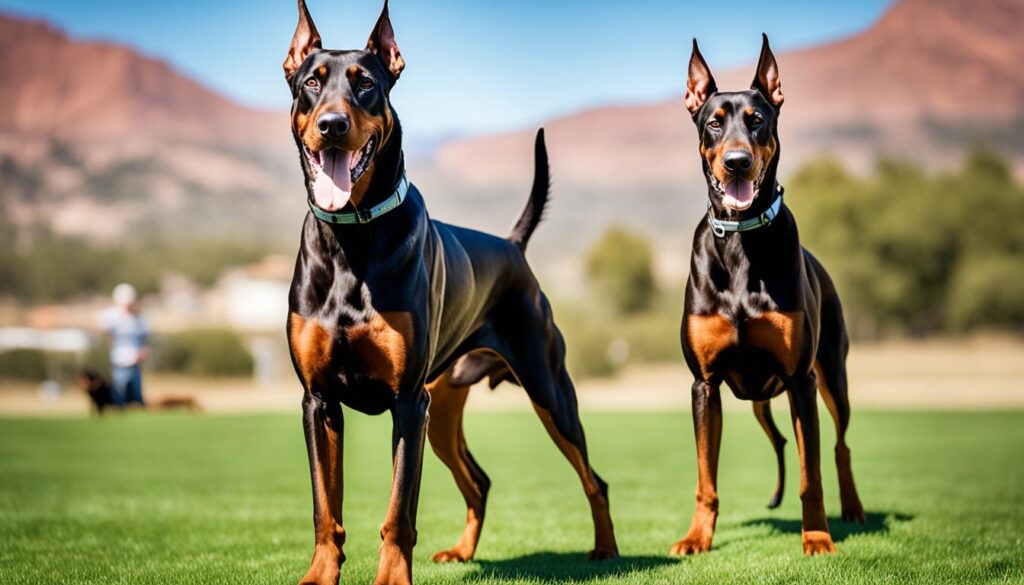
Conclusion
Doberman Pinschers are a unique and noble breed known for their loyalty, intelligence, and protectiveness. As family pets and companions, they have the potential to bring immense joy and love to your home.
Proper care is crucial to ensure the health and well-being of your Doberman. Regular vet check-ups, a nutritious diet, and exercise are essential for their overall longevity. Additionally, training and socialization play a significant role in shaping their behavior and temperament.
When considering adding a Doberman to your family, it is important to prioritize adopting from rescue organizations or reputable breeders. This ensures that you provide a loving home to a Doberman that is in good health and has received adequate care and attention.
FAQ
What are the characteristics of a Brown Doberman dog breed?
Brown Dobermans, also known as Doberman Pinschers, are large and intelligent dogs. They have short, smooth coats and can come in brown or black with rust-colored markings. They are known for their loyalty, intelligence, and protectiveness.
How big do Dobermans typically get?
Male Dobermans usually stand around 27-28 inches tall and weigh about 70 pounds, while females are slightly shorter at 26-27 inches and weigh about 60-65 pounds. They are considered a medium-to-large breed.
What is the temperament of a Doberman?
Dobermans are known for being intelligent, loyal, and alert. They have a strong bond with their families and are protective by nature. With proper training and socialization, they can be affectionate and sweet with people. However, some Dobermans may bond more closely to one person and require regular exercise to prevent irritability or aggression.
How should I care for a Doberman’s grooming needs?
Dobermans have short, smooth coats that are low maintenance and require regular brushing. They are generally healthy, but like any breed, they can be prone to certain genetic health issues such as hip dysplasia and heart conditions. Regular veterinary check-ups and a healthy diet are important for their overall well-being.
How should I train and socialize my Doberman?
Early training and socialization are crucial for Doberman Pinschers. They are intelligent and eager to please, making them highly trainable. Positive reinforcement methods work best with this breed. Dobermans can be aggressive if not properly socialized, so early exposure to new people, animals, and environments is important.
What are the common health issues in Dobermans?
Dobermans are generally a healthy breed, but they can be prone to certain genetic health issues such as hip dysplasia and heart conditions. Regular veterinary check-ups and a healthy diet are essential for their overall well-being. The average lifespan of a Doberman Pinscher is 10-13 years.

